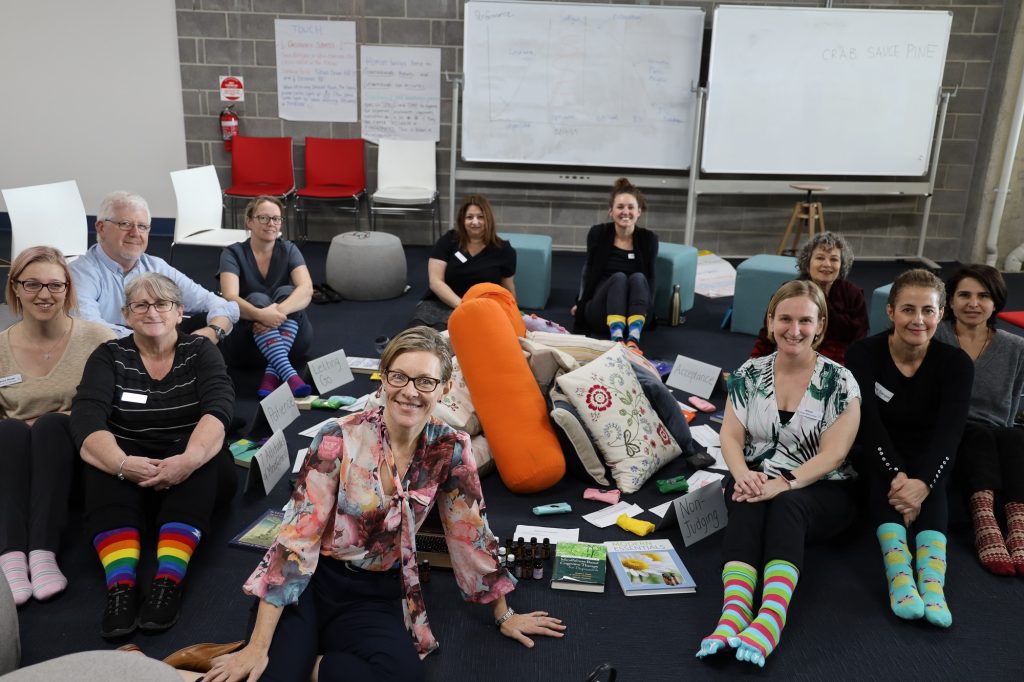 September 7, 2020
September 7, 2020Northern Health is celebrating ‘Virtual Conversation on Mental Wellness Week’, starting today, with numerous online sessions to help staff focus on their wellbeing and mindfulness.
Jo Gibbs is no stranger to Northern Health. During the first Conversations on Mental Wellness in 2018, she stepped into the lecture room barefoot, holding a spray of refreshing citrus notes, and in a few seconds transported the whole room straight into a summer afternoon somewhere in the Mediterranean.
“Inhaling orange scent instantly improves our mood,” she started her talk on healthcare workers’ wellbeing.
By profession a nurse, Jo now runs popular Therapeutic Relaxation And Enhanced Awareness Training (TREAT), which helps healthcare workers and their colleagues rest, recover and stay mindful. These sessions usually include gentle stretching, followed by relaxation and guided meditation practices on the floor. The carefully decorated session room is always filled with huge cushions, warm blankets, soft lighting, numerous crystals and essentials oils, supported by relaxing music, providing a safe heaven and true sensory experience for everyone.

TREAT started as a trial one-off session six years ago. Today, TREAT rest and recovery sessions are Jo’s full-time job, and regularly on offer for staff at Northern Health. They are also an important part of the ‘Virtual Conversations on Mental Wellness’ which starts today.
“A couple of years ago, I went back to university to do my post-graduate studies, and while I was on placement in a busy public hospital I suddenly realised the stress and anxiety have started to ramp up. That is when I had the light bulb moment that I need to pull together everything I know about self-care and share with my colleagues,” she explained.
Jo has always felt strongly about helping others and is currently doing her second study on how TREAT sessions are helping with mental health. Through her sessions, she helps participants restructure thoughts and focus on how their day begins, shifting their mindset from feeling flat and negative to warm feelings of hope and motivation.
“I realised that how I start the day resonates throughout the whole of my day. If we can actually practice just 15 minutes of anchoring ourselves, and filling ourselves up, we are more likely to have steadiness for the rest of the day. Life, work and home bring a lot of curve balls and we need to fill ourselves, like we would fill up our car on the way to work. Let’s tell ourselves that today will be a good day and something great will happen,” she explained.
In her surroundings, Jo observes how the current pandemic is increasing problems with anxiety, loneliness and the feeling of worry with many people.
“There is a very subtle grieving process people are going through. Many of us aren’t even aware of it, it’s something the literature calls – ambiguous loss. We are not sure what we have lost, but there is a lot of feeling of loss. Because we can’t actually see the virus, it makes it even harder – it’s like being battle-weary, but we can’t see the war. We are aware we have lost our freedom, which has led to a huge feeling of collective heaviness and demotivation,” Jo explained.
To get out of the spiralling thoughts of anxiety, Jo recommends finding something simple to look forward to. It can be walking with the loved one and looking at the moon and stars, making the whole experience extra sensory, or ordering take away and putting on a nice table setup.
“There are findings that 59 per cent of people don’t make their bed in the morning. I would recommend everyone to make their beds. It takes 30 seconds. Once you make your bed, your room starts to look neater. By adding an extra cushions or flowers, you can make it like a luxurious hotel room. That can be the start of feeling good in the morning,” she explained.
The famous line “put your own oxygen mask first before putting it on to others” often comes up when we talk about mindfulness, and Jo feels for healthcare workers, this translates to taking our own pulse first.
“There is something deeper about that, as our pulse is telling us how we are doing, how are hearts are doing and if our minds are anxious. We need to take our own pulse first before we take someone else’s”.
During the week, Jo would be offering to all staff a daily 15 minute ‘focus on mental clarity’ sessions and a longer 45 min full rest and recovery TREAT session on Thursday evening, 7 pm, both via MS Teams. Please see Northern Health Intranet for more information or email ohswb@nh.org.au to get a calendar invite.


